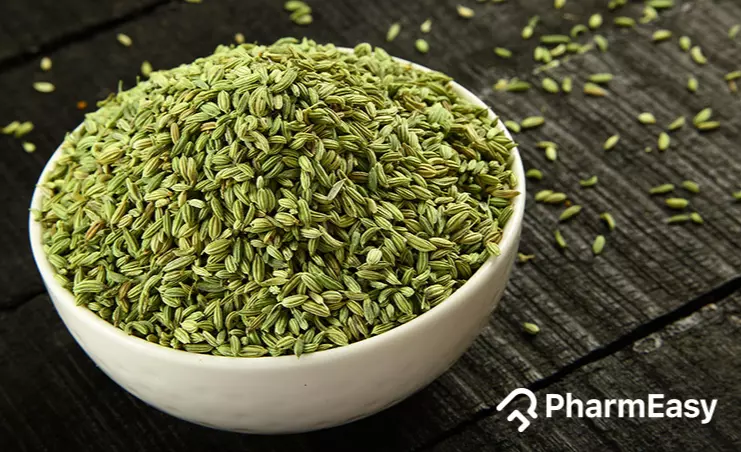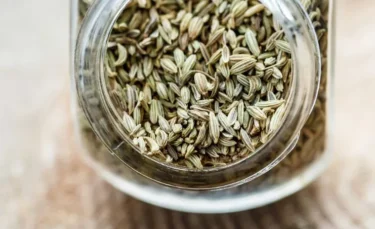Fennel (Saunf) Seeds: Uses, Benefits, Side Effects, and more!
By Dr Rajeev Singh +2 more

Get,

to manage your symptom
Get your,


4 Cr+ families
benefitted

OTP sent to 9988776655



You’ve successfully subscribed to receive
doctor-approved tips on
Whatsapp

Get ready to feel your best.

Hi There,
Download the PharmEasy App now!!


Register to Avail the Offer
Send OTPBy continuing, you agree with our Privacy Policy and Terms and Conditions

Hi There,
Sign up on PharmEasy now!!
Trusted by 4 crore+ families

OTP sent to 9988776655



You have unlocked 25% off on medicines




Code: NU25
By Dr Rajeev Singh +2 more
Table of Contents
Foeniculum vulgare, commonly known as Fennel, is an aromatic plant belonging to the Apocynaceae family1. The Foeniculum vulgare, commonly known as fennel, is an aromatic plant belonging to the Apocynaceae family. The fennel seeds have a distinct shape, size and colour; they have a long and thin body with a pale green or brown colour. The fennel plant is grown for its seeds, leaves and edible shoots. Fennel seeds are used as kitchen spices around the world. In India, fennel seeds are popularly known as saunf. India is one of the largest exporters of fennel. All its parts are rich in antioxidants2.
Fennel seeds contain range of nutrients helpful for human health. Fennel seeds contain multiple vitamins and minerals, and fatty acids as well. Here is nutritional value of fennel seeds (per 100 grams)3

Vitamins present in fennel seeds (per 100 grams)3
Owning to the presence of a range of phytochemicals and nutrients, fennel may show the following properties.
The potential uses of fennel seeds against many disease conditions are given below.

Traditionally, fennel has been used as a carminative agent. It may help remove the accumulated gas from the stomach, relieving bloating. Fennel water may also manage flatulence (gas) in infants1. Fennel seeds may promote the release of digestive secretions necessary for good digestion and absorption of food2. Fennel extract might be used for its protective activity against stomach damage4. However, you need to reach out to your healthcare provider if you experience stomach problems.

These activities have been observed in lab-scale studies. With some larger human studies, there is potential for fennel seeds to be used as a medicine to treat infections. Till then, you are advised to consult with a doctor if you encounter any infection.
Based on my experience, I have observed that fennel extract might possess antifungal properties. Fennel extract might effectively combat different types of fungi, including those causing skin infections including candidiasis5.
Dr. Siddharth Gupta, B.A.M.S, M.D (Ayu)

Fennel seed oil could avoid liver damage and act as a hepatoprotective (liver protective) in an animal study. Oral intake of fennel seed oil could also decrease the levels of enzymes associated with liver damage1,4. Thus, saunf is indeed good for the liver. However, more studies are needed to support the use of fennel for liver problems in humans. Therefore, you are advised to follow the doctor’s advice if you suffer from any liver problems.

The fennel seed oil could reduce blood sugar levels and showed hypoglycemic activity in diabetic rats during an animal trial. Also, fennel essential oil could improve the pathological changes in the pancreas and kidneys because of diabetes1,4. Larger human studies could help demonstrate the efficacy of fennel seeds in preventing damage to vital organs due to long-standing diabetes. Therefore, avoid using fennel seeds or other herbal remedies for diabetes without talking to your healthcare provider first.

Fennel seeds could prevent tumours from developing when used in the diet during a study. Fennel seeds could show positive effects against carcinogenesis (cancer formation). Fennel seeds could also show anticancer activity (cancer cell killing), as they kill cancer cells in the mice. Fennel can be used as a natural source of anticancer agents4. More studies are required to support the use of fennel seeds in cancer, and you are advised not to use any herbal remedy to cure or prevent cancer without consulting your doctor first.
Though there are studies showing the benefits of fennel seeds in various conditions, these are insufficient and there is a need for further studies to establish the true extent of the benefits of fennel on human health.
There are many ways can make use of fennel seeds.
You must consult a qualified doctor before taking fennel seeds or herbal supplements. Likewise, do not discontinue or replace an ongoing treatment of modern medicine with an ayurvedic/herbal preparation without consulting a qualified doctor.
In my experience, I have observed that crude fennel extract may have anxiolytic properties, which could potentially help reduce anxiety. This is because fennel contains phytoestrogens, which are plant compounds that can mimic the effects of oestrogen in the body5.
Dr. Rajeev Singh, BAMS
There are no reported side effects of fennel owing to its long history of applications4.
However, some people may react differently to common herbs and foods. Therefore, if you experience any side effects after using fennel seeds, you should immediately reach out to your healthcare provider.
Sometimes fennel seeds are promoted as a potential weight-loss aid. The idea that fennel seeds might help with weight loss may have some validity. According to a preliminary study, consuming fennel seeds decreases hunger and considerably lowers overeating at meals. Fennel seeds may be beneficial for persons whose obesity is brought on by food cravings and overeating. I recommend before utilising fennel seeds to aid with weight control, see your doctor6.
Dr. Smita Barode, B.A.M.S, M.S.
Also Read: Alum: Uses, Benefits & Side Effects
Here are some general precautions you need to follow while using fennel seeds.
Before using fennel seeds or any other herbs for their properties, you need to consult with your healthcare provider. They will be able to guide you better about the possible precautions you need to take to avoid unwanted side effects.
Sometimes breastfeeding mothers struggle to produce enough milk to fulfil their babies’ needs. That issue may be resolved with fennel seeds. An important component of fennel seeds called anethole mimics oestrogen and may aid in promoting milk production. Consuming fennel seeds may boost prolactin, the hormone that stimulates milk production, according to some research. I suggest ask your doctor if drinking fennel seed tea might help if you’re facing difficulty in producing sufficient milk while breastfeeding6.
Dr. Anuja Bodhare, B.A.M.S, M.D (Ayu)
Also Read: Flax seeds (Alsi): Research-Backed Health Benefits
The possible interactions of fennel seeds with medicines are given below.
Also, if you are taking medication for any health condition, make sure to talk to your healthcare provider about the possible interactions of the drug with other medicines and herbs. This will help you avoid any unwanted effects and interactions.
Also Read: Urad Dal: Uses, Benefits & Side Effects
Fennel (Saunf) is a plant grown for its seeds, leaves and edible fruits. Fennel seeds are widely used around the world2.
Fennel seeds are called Saunf in India2.
Fennel is useful for digestion. It has shown some benefits for diabetes and cancer. It is also beneficial for the liver and has shown antibacterial, antifungal and antioxidant benefits1,2,4. However, before using fennel seeds against any disease condition, consult your healthcare provider to get a proper diagnosis and treatment.
Fennel tea can be used as a mouth freshener. You can also prepare fennel tea and fennel water1,2.
Fennel seeds as no reported side effects. It is safe to use4. However, if you experience any mild or severe effects after using fennels seeds, you need to reach out to your healthcare provider immediately.
Using fennel tea regularly may help flush out excess bodily fluids as it may show a diuretic property. Fennel tea may also show carminative activity. It may help in removing gas from the stomach1,2. You should consult your healthcare provider before using fennel or any herbal tea for its health benefits.
You can use fennel water to treat flatulence. Gripe water is a preparation of fennel seeds used to treat flatulence (accumulation of gas) in infants1. However, any herbal remedy should be used after consulting a healthcare provider.
1. Rather MA, Dar BA, Sofi SN, Bhat BA, Qurishi MA. Foeniculum vulgare: A comprehensive review of its traditional use, phytochemistry, pharmacology, and safety. Arabian Journal of Chemistry. 2016 Nov 1;9:S1574–83. Available from: https://www.sciencedirect.com/science/article/pii/S1878535212000792
2. Fennel: The Multi-faceted Healer. INDIAN CULTURE [Internet]. [cited 2022 Apr 8]. Available from: https://indianculture.gov.in/food-and-culture/spices-herbs/fennel-multi-faceted-healer
3. Badgujar SB, Patel V v., Bandivdekar AH. Foeniculum vulgare Mill: a review of its botany, phytochemistry, pharmacology, contemporary application, and toxicology. Biomed Res Int [Internet]. 2014 [cited 2022 Apr 8];2014. Available from: https://pubmed.ncbi.nlm.nih.gov/25162032/
4. Fennel – Drugs and Lactation Database (LactMed) – NCBI Bookshelf [Internet]. [cited 2022 Apr 8]. Available from: https://www.ncbi.nlm.nih.gov/books/NBK501793/
5. Noreen S, Tufail T, Badar Ul Ain H, Awuchi CG. Pharmacological, nutraceutical, functional and therapeutic properties of fennel (Foeniculum vulgare). Int J Food Prop. 2023;26(1):915–927. doi: 10.1080/10942912.2023.2192436. Available from: https://www.tandfonline.com/doi/full/10.1080/10942912.2023.2192436#d1e184
6. WebMD. Health Benefits of Fennel Seeds [Internet]. Medically Reviewed by Dany Paul Baby, MD; 18 Sep 2022 [cited 2026 Jan 09]. Available from: https://www.webmd.com/diet/health-benefits-fennel-seeds
Disclaimer: The information provided here is for educational/awareness purposes only and is not intended to be a substitute for medical treatment by a healthcare professional and should not be relied upon to diagnose or treat any medical condition. The reader should consult a registered medical practitioner to determine the appropriateness of the information and before consuming any medication. PharmEasy does not provide any guarantee or warranty (express or implied) regarding the accuracy, adequacy, completeness, legality, reliability or usefulness of the information; and disclaims any liability arising thereof.
Links and product recommendations in the information provided here are advertisements of third-party products available on the website. PharmEasy does not make any representation on the accuracy or suitability of such products/services. Advertisements do not influence the editorial decisions or content. The information in this blog is subject to change without notice. The authors and administrators reserve the right to modify, add, or remove content without notification. It is your responsibility to review this disclaimer regularly for any changes.
Comments

Leave your comment...
You may also like
Comments